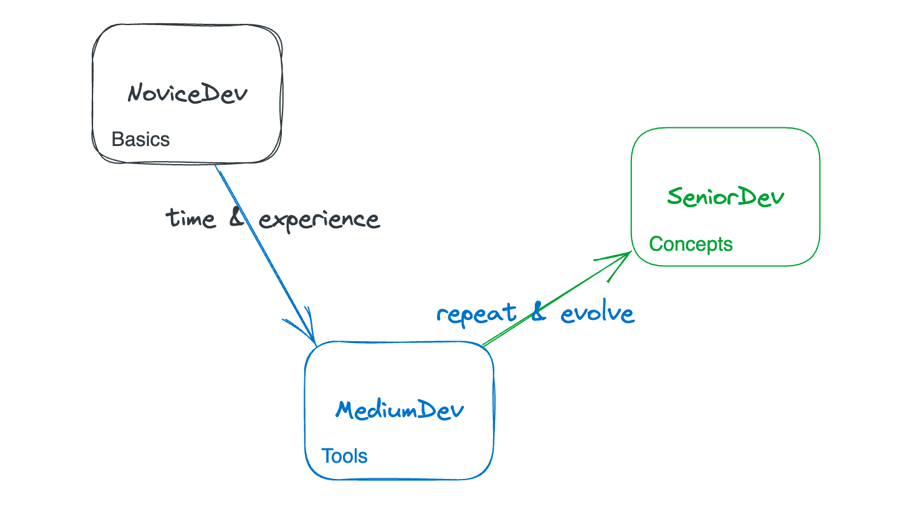5 Challenges for a Novice Developer and How to Manage Them
The author of this article is EPAM Lead Software Engineer Gabriel Raducu.

Introduction
The journey toward becoming a proficient developer is filled with challenges, especially for those new to the field. In this article, I explore some common obstacles and share insights based on my personal experience to help beginners effectively overcome them.
5 challenges for a novice developer
Challenge 1 — Understanding frameworks, libraries, tools, and languages
Tip: Start with the fundamentals. Building a solid foundation in the basics of your chosen technology is essential. Explore tutorials, documentation, and online courses to help you grasp the core concepts.
My experience: My own journey didn't start in programming, but rather in scriptwriting. I wrote scripts that turned clients' Word documents into online surveys using pre-made templates. After mastering everything available in online surveys, I wanted to expand my knowledge since I was using a lot of jQuery without fully understanding what it does and why. Don't repeat my mistakes.
Challenge 2 — Finding the right tools
Tip: Seek recommendations from experienced developers and consider trying out a few different tools to determine which ones align with your workflow and preferences.
My experience: When I received my first project as a developer, I could have gone with vanilla JS or jQuery, but I quickly realized that the number of duplications and element referencing would crush my code. So, I went with AngularJS. When I chose it, I literally didn’t understand any of the concepts behind it. I just liked the structure, the reusability it provided, and how it eased my work. Obviously, this is not an approach I recommend.
Challenge 3 — Bridging knowledge gaps
Tip: Embrace a growth mindset and never stop learning. Engage in coding challenges, read books, and participate in online forums and communities to broaden your knowledge.
My experience: When I got another project, it involved many challenging and sometimes unclear tasks. Fortunately, I had the world's greatest ally in my corner — Stack Overflow. Link by link, we pieced some code together to craft a viable solution, but it failed miserably. At that point, it became clear that I lacked a basic understanding of the language itself. Once I got the fundamentals right, there it was: an actual working solution. Although it was functional, it still required fine-tuning, memory optimization, and other refinements.

Challenge 4 — Striving for developing impressive solutions
Tip: Start small, gain experience gradually, delve deeply into the language, and don't shy away from seeking mentorship or collaborating with more experienced developers when tackling ambitious projects.
My experience: After a couple more years of working on Angular frontend apps, I faced a new challenge: creating a dynamic online questionnaire. I felt a rush of excitement as I realized that I could leverage my deep understanding of the business to design an impressive solution. But my knowledge of the language still was not sufficient. I thought I had mastered the Angular framework, but I failed to understand JavaScript, and I had to commit the team to deliver our simple solution within a short time. We delivered it, but it wasn’t the best solution.
Challenge 5 — Adapting to changing technologies
Tip: Explore a variety of technologies and frameworks. Consider the specific requirements of your project and choose the tool or concept that aligns best with the task at hand.
My experience: For almost my entire career, I was utterly convinced that Angular is the only way to create high scale frontend applications. I couldn’t have been more wrong, and this blindness kept me chained to the same approaches and practices for a long time. Finally, I started using React. It wasn’t easy. At that point, I asked myself, should I — a senior Angular developer — switch sides and become a middle React developer? I had no idea how to do most things using React, or why some of them are so complicated. But this challenge offered me the freedom to explore a realm where I had more choices and flexibility.
Conclusion
I think the key take-away here is that you shouldn’t limit yourself to thinking that if you have a hammer, every problem is a nail. Don’t try to solve all problems using a single framework, even if you can. I suggest understanding the standards around your deliverables, and picking the tool that best helps you get there.
Our job as engineers is to find solutions to the problems in front of us. If it’s faster to do that in Svelte or Solid, and the result is readable, maintainable, and infinitely scalable, then go with it. Don’t be afraid of the syntax barrier of a new framework. Look at the concept behind it. Does it fit with the current stack puzzle, or does it create more problems than it solves?
Finally, it's important not to fall into the trap of constantly trying every new option without truly understanding any of them, or obsessively trying to optimize every little detail. Instead, approach technology as an ongoing experiment. Explore different variants to find what best suits your needs. And don't forget to occasionally revisit your old passions. Frameworks constantly evolve, and you might just discover new ways to blend the old with the new in your journey.


.png)
